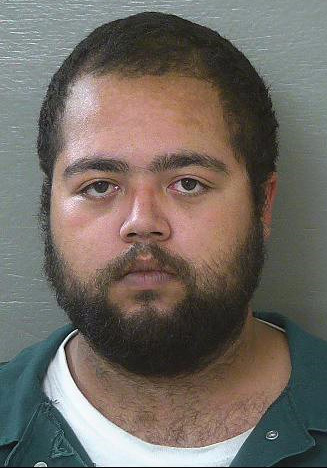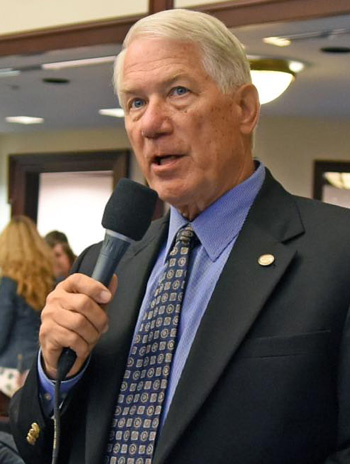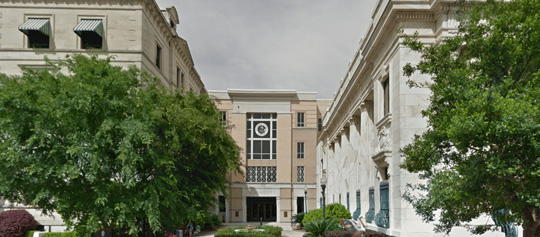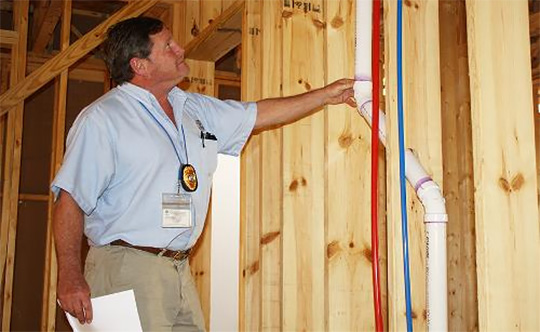Dispose Of Natural Christmas Trees At The Curb
December 28, 2017
Residents wishing to dispose of organic Christmas trees can do so by simply placing the tree curbside with all decorations, ornaments and any attached tree stands removed. Trees or segments of trees should not be more than six feet in length. Do not place Christmas trees in recycling or garbage containers.
In unincorporated Escambia County, ECUA will remove curbside trees on the customer’s normally scheduled yard waste collection day.
The Town of Century will remove Christmas trees in their regular bulk pickup on the first and third Tuesdays of the month. Crews will begin removing trees placed on the curb in the incorporated areas Tuesday, January 2. It may take several days for the trees to be removed, according to town officials.
City of Pensacola Sanitation will remove trees placed on the curb on the customer’s regular trash collection day.
Mobile Home, Heavy Truck Registrations Due By January 1
December 28, 2017
Escambia County residents who own mobile homes, heavy pickups, nine-passenger, for hire and commercial vehicles should renew their registrations by December 31, according to Escambia County Tax Collector Scott Lunsford.
Mobile homes taxed as real property must display a permanent RP decal. Mobile homes not taxed as real property are subject to yearly registration fees. Each section of the mobile home requires a separate registration, which must be displayed and visible from the roadway. Registration fees are based on the length of the mobile home and must be renewed by December 31. A delinquency fee will be charged if the registration is not renewed by January 10, 2018.
Florida law requires that registrations for all trucks with an empty weight of 5,000 pounds or more expire in December. The registered owner is required to declare a gross vehicle weight (GVW). Registration fees are determined by the gross vehicle weight.
For more information, please visit our web site at EscambiaTaxCollector.com. Citizens are encouraged to contact the tax collector’s office at ectc@EscambiaTaxCollector.com or (850) 438-6500, ext. 3252 with any questions.
Controlled Substance Dispensing Rule To Change Monday In Florida
December 28, 2017
Beginning Monday, January 1, pharmacies and physicians who dispense controlled substances will have just one day to report information to the statewide prescription-drug monitoring program.
 Currently, pharmacies and physicians are required to report the information as soon as possible to the state but are given upward of seven days to comply with the reporting requirements.
Currently, pharmacies and physicians are required to report the information as soon as possible to the state but are given upward of seven days to comply with the reporting requirements.
The Legislature passed a bill in 2017 that trimmed the reporting time and required that reporting be done through the state-approved electronic reporting system.
The Legislature during the 2018 session is expected to pass legislation to help abate the state’s opioid epidemic, and lawmakers are considering whether to mandate that doctors use the database before prescribing controlled substances. The database was established to track the dispensing of prescribed controlled substances to provide information to physicians and to prevent the over-prescribing and diversion of such substances.
Most dispensers are required to report the information, though exemptions are provided if the controlled substances are dispensed by practitioners for one-time, 72-hour emergency supplies for patients. Exemptions also are made when controlled substances are dispensed in emergency rooms, rehabilitative hospitals, assisted living facilities or nursing homes, so long as they were ordered by treating physicians.
by The News Service of Florida
Health Care Spending, Regulation Confront Lawmakers
December 28, 2017
Battles over health-care spending and regulation of Florida’s vast health-care industry are likely to command a great deal of time and attention when the Florida Legislature convenes in January for its annual session.
Lawmakers are again expected to engage in a tug-of-war about what type of regulations should be in place for health-care facilities, but a main focus will be on Florida’s strained safety-net health program at a time of tight state finances.
Florida’s Medicaid program already costs $26 billion and covers an estimated 4 million people.
A July snapshot by the Kaiser Family Foundation estimated that Medicaid along with a major children’s health-insurance program provide coverage to two out of every five low-income people in the state, half the state’s children and more than three-fifths of all nursing home residents.
The bulk of money for Medicaid comes from the federal government, but this year more than $6 billion comes from general revenue, the state’s main budget account funded primarily by sales taxes.
House Health Care Appropriations Chairman Jason Brodeur, R-Sanford, said hurricanes Irma and Maria put “a bit of a strain” on the budget he oversees, and as a result that could hamper any requests for new social-services spending.
“From the explicit costs of providing more health and human services to a larger than anticipated population, to the implicit costs of things like the overtime paid to our (state employees) who are in charge of registering and providing (benefits) to all those new enrollees, all of those costs must be paid for before we can start looking at new programs,” he said.
Nevertheless, Brodeur said members have filed more than 200 requests to fund local projects “which is the exact opposite of `small government.’ ”
During the 2017 session, legislators agreed to change how the state pays nursing homes to provide care for the poor and seniors who rely on Medicaid. Lawmakers decided to scrap a longstanding system where nursing homes have been paid based on audited cost reports and agreed to implement a prospective payment system where payments are determined in advance, regardless of the intensity of the services provided.
While lawmakers agreed to change the payment methodology, they delayed implementation of the new system until 2018. Brodeur said the conversion “is our next step in efficiency.”
Senate President Joe Negron, though, wants the Legislature to do more than pull the trigger on the prospective-payment system. He wants to increase the amount of money the state directs to paying nursing homes.
“That’s a very strong priority of mine,” said Negron who, quoting Sen. Lizbeth Benacquisto, notes that the average Medicaid-funded nursing home resident in Florida is an 85-year-old woman.
“These are the women who shaped our communities. We have a responsibility to give them the highest level of care,” Negron said.
The Stuart Republican also said he would like to help the industry offset the costs of generators that Gov. Rick Scott has mandated for nursing homes after deaths at a Broward County nursing home following Hurricane Irma. Negron predicted that the generators “will ultimately be a shared endeavor between the state and the industry.”
But Negron’s push to increase reimbursement for nursing homes and offset the costs of generators also comes at a time when two state agencies are requesting funding to help plug deficits.
The Agency for Persons with Disabilities is asking for $34 million in general revenue to help cover a $89 million deficit in a Medicaid waiver program that enables developmentally disabled people to live in communities instead of institutions. Also, the Department of Health is requesting $25 million to plug a shortfall in the Children’s Medical Services program, which pays the health care costs for medically complex children covered by Medicaid.
Negron downplayed the deficits in the programs and the effects they could have on new funding requests during the 60-daysession, which starts Jan. 9.
“You have to make difficult decisions,” Negron said of crafting the state budget. “That’s why I think the budget process is fascinating.”
While the annual budget is the only bill the Legislature is required to pass when it meets, it isn’t the only piece of health-care legislation that members will focus on.
Indeed, there are hundreds of bills filed for consideration, from requiring birth centers to report adverse events to state health care regulators (SB 510 and HB 673) to authorizing new needle-exchange programs to try to prevent the spread of infectious diseases (SB 800 and 579).
The Legislature will once again consider passing a bill that would allow ambulatory surgical centers to keep patients overnight. Florida law currently requires the surgical centers to release patients the same day they are admitted and cannot keep patients overnight.
“It’s silly that people have to be discharged the `same work day’ and not 24 hours. The marketplace could open up for consumers if they could adjust their schedules for the 24-hour standard,” Brodeur said.
The legislation (HB 23) is already ready for the House floor. While the House bill also would authorize and license so-called “recovery care centers,” to provide post-surgical and post-diagnostic care to patients for up to three days, the Senate version (SB 250) would only authorize overnight stays at ambulatory surgical centers.
Sen. Greg Steube, a Sarasota Republican sponsoring the Senate version, said he does not plan to take the House bill as it has been drafted. “It’s my intention just to get the 24-hour piece done,” he said.
The House also is poised to vote on a measure (HB 27) that would eliminate a controversial regulatory program for hospitals that’s known as certificate of need. Bill sponsor Rep. Heather Fitzenhagen, R-Fort Myers, said ending the regulations would remove “barriers to entry” and increase competition in the hospital industry.
“I think competition is healthy in almost all settings,” she said.
But critics have raised questions about how lifting the regulations, which require state approval of new facilities and programs, would affect older public hospitals that provide a wide array of services.
And while the legislation is touted as eliminating artificial barriers that impede competition, the bill would only eliminate so-called CONs for hospitals. New nursing home beds and facilities would still be regulated by the CON program.
The Florida Health Care Association, a statewide nursing-home group, has lobbied against legislative efforts to eliminate CONs for long-term care providers.
House Health Quality Subcommittee Chairman Rep. James Grant said he supports eliminating CONs for hospitals and nursing homes but said he won’t vote against Fitzenhagen’s bill for not including nursing homes.
“Some repeal is better than no repeal,” Grant, R-Tampa, said.
The Senate does not have a companion bill, though, and the potential CON elimination is opposed by much of the powerful hospital industry.
Florida Hospital Association President Bruce Rueben said certificate-of-need requirements have ensured that low-income communities and rural communities have access to inpatient, acute-care health services.
“CON deregulation would allow a proliferation of these services in affluent communities and undermine hospitals serving communities with high numbers of uninsured and underinsured Floridians,” Rueben said.
by Christine Sexton, The News Service of Florida
File image.
Flomaton Police Seeking Burglary Suspect
December 28, 2017
 The Flomaton Police Department is asking for the public’s help in locating 26-year old Patrick David Griffis.
The Flomaton Police Department is asking for the public’s help in locating 26-year old Patrick David Griffis.
He is wanted by Flomaton Police on charges of felony third degree burglary, first degree theft of property and misdemeanor criminal mischief. He is described as a white male, about six-feet tall, 175 pounds with blue eyes and brown hair.
Anyone with information on his whereabouts is asked to contact the Flomaton Police Department at (251) 296-5911.
Molino Man Charged With Battery On Wife, Her Grandmother
December 27, 2017
A 25-year old Molino man has been arrested for allegedly striking his wife and pushing his wife’s grandmother out of a doorway and into her walker during a heated argument.
 Adrian Edmund Jones, 25, was charged with a felony count of battery on a person 65 years or age or older and battery.
Adrian Edmund Jones, 25, was charged with a felony count of battery on a person 65 years or age or older and battery.
The wife told deputies that she was playfully wrestling in bedroom with Jones when he began to punching her with a closed fist repeatedly in her ribs and struck her in the eye as the wrestling escalated violently. The wife exited the bedroom and stood behind her grandmother, according to an arrest report.
As Jones attempted to exit the bedroom, the grandmother reportedly stood in the doorway before being pushed out of the way.
The 74-year old woman then retreated to her kitchen and grabbed a large butcher knife to defend herself. After a brief standoff between the elderly woman and Jones, he reportedly fled the residence on Sunshine Hill Road. The grandmother refused medical treatment at the scene.
Jones was released from the Escambia County Jail on a $5,000 bond, according to jail records.
Three Percent Tax Discount Ends December 31
December 27, 2017
Scott Lunsford, Escambia County Tax Collector, reminds everyone that the three percent discount on payment of real estate and tangible personal property taxes ends Sunday, December 31.
To receive the three percent discount, payments must be:
· mailed with a December postmark;
· left by midnight, December 31, in a 24-hour drop box available at all locations; or
· made online by midnight, CST, December 31, at EscambiaTaxCollector.com.
To have a receipt dated with a December 2017 date, payments must be received in our office by close of business December 29 or made online by midnight, CST, December 31.
Since all offices are closed December 31 and January 1, customers who make their payment in person at any tax collector office on Tuesday, January 2, will receive the three percent discount, however, their payment will be dated January 2, 2018 not December 31, 2017.
Customers now can get in line online through QLess, a more convenient way to join the line. Once you choose which line to join, you will receive a message with your approximate service time; you then can continue your regular activities until your service time approaches. You will receive status updates, be able to request additional time, if necessary, or cancel your spot if unable to make it. This system eliminates the need for sitting in crowded lobbies for your number to be called.
There are four ways to join the queue:
· download the QLess app (available on iTunes and Google Play)
· text an office location to (850) 344-1875
o ectc downtown
o ectc marcus pointe
o ectc molino
o ectc warrrington
· online at EscambiaTaxCollector.com
· in person at any of our four convenient tax collector offices
To check the status of your taxes or to pay online, visit our web site at EscambiaTaxCollector.com. Taxpayers are encouraged to contact the tax collector’s office by phone or email ectc@EscambiaTaxCollector.com with any questions.
Ransom Middle’s Powell Named Blues Angel Music Educator Of The Year
December 27, 2017
Katherine Powell of Ransom Middle School in Cantonment has been named the Blues Angel Music Foundation 2017 Music Educator of the Year for Escambia County.
 Powell is the choir director at Ransom. Throughout the year, she has worked to grow and improve the school’s choir program.
Powell is the choir director at Ransom. Throughout the year, she has worked to grow and improve the school’s choir program.
In 2016, Powell was named one of Escambia County School District’s Champions of the Arts for her innovative technology-based curriculum for elementary general music. She is also the assistant director of elementary and middle school choir with the Pensacola Children’s Chorus.
“Teachers should want to teach and be willing to put in the incredible amount of work it takes to be a good teacher,” Powell said.
Adam Koppin of Rhodes Elementary in Milton was named the 2017 Music Educator of the Year for Santa Rosa County.
“Both of these music educators deserve our praise for the work they’re doing to continue to bring music education to the students in Escambia and Santa Rosa counties” said Dan Fugate, administrative director of the Blues Angel Music Foundation, a nonprofit group supporting music education and therapy.
Bill Would Raise Florida’s Smoking Age From 18 To 21
December 27, 2017
Rep. Lori Berman, a Lantana Democrat, intends to move forward with a bill seeking to raise the legal age for smoking in honor of the measure’s co-sponsor, Rep. Don Hahnfeldt, a Republican from The Villages who died of cancer on Sunday. “I was saddened to learn of Rep. Don Hahnfeldt’s passing,” Berman tweeted on Tuesday.
 “I was honored to have worked with him on raising the tobacco purchase age to 21 and will pursue this important issue in his legacy.” Last week, Hahnfeldt and Berman filed a proposal (HB 1029) that would raise the legal age for smoking from 18 to 21.
“I was honored to have worked with him on raising the tobacco purchase age to 21 and will pursue this important issue in his legacy.” Last week, Hahnfeldt and Berman filed a proposal (HB 1029) that would raise the legal age for smoking from 18 to 21.
In a press release issued with Berman, and Senate sponsor David Simmons, R-Altamonte Springs, Hahnfeldt said raising the legal age “will save a projected early loss of life of 270,000 young lives and $8.6 billion in health care costs, as well as $8.3 billion in productivity losses.”
Hahnfeldt, 73, was a first-term member of the House whose district includes Sumter and parts of Lake and Marion counties. He spent 32 years in the Navy, commanding two nuclear submarines and later serving as commander of the Pacific Fleet’s Strategic Submarine Squadron.
by The News Service of Florida
Escambia Building Inspections Moving From Escrow To Online Payments
December 27, 2017
As part of the transition to a new online payment system for Escambia County Building Services, contractor escrow account payments will no longer be accepted beginning Monday, Jan. 1. While online payments will not be available until mid-January as part of the new MyGovernmentOnline permitting system transition, fees can continue to be paid in cash, checks, money orders, and with debit and credit cards over the phone, in person and via fax.
All escrow accounts will be deactivated on Friday, Dec. 29 at 4:30 p.m. The balance remaining in the account will be returned to the license holder/business on the account via check from the Escambia Clerk of Court. While deposits can no longer be made into the accounts, contractors may continue to have payments deducted from their escrow until the account is deactivated on Dec. 29.
When the new permitting and inspection software is fully launched mid-January, contractors and residents will have the ability to:
- Apply online for permits
- Pay permit fees online with Visa and MasterCard
- Submit plans and documents “paperless” in PDF format
- Track application progress up to permit issuance
- View and print copies of review comment letters
- View and print copies of approved building plans
- Request inspections online (currently available through customer portal)
- View and print completed inspection reports
- Receive real-time email or telephone call notifications when an inspection is completed
Contractors and citizen-builders are encouraged to create a free portal account now at MyGovernmentOnline.org.
A free training course for contractors will be held Monday, Jan. 15 at 9 a.m. and 2 p.m. at the Central Office Complex located at 3363 West Park Place. The course will cover how to utilize all of the program services.
For more information, please contact Escambia County Building Services at 850-595-3550 or buildinginspections@myescambia.com.






